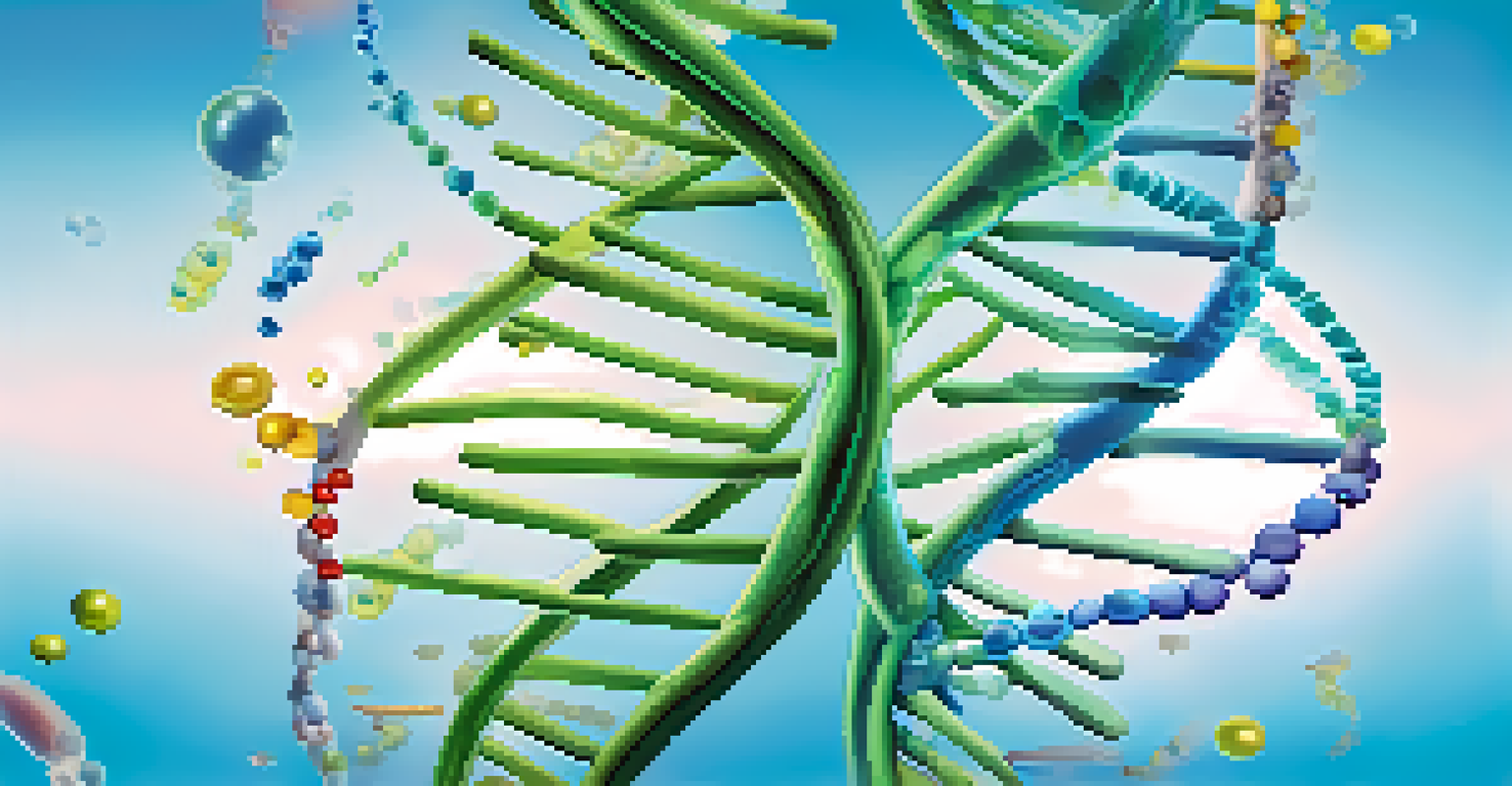The Role of Genetics in Gut Microbiome Diversity

What is the Gut Microbiome and Why Does It Matter?
The gut microbiome refers to the vast community of microorganisms living in our digestive tracts, including bacteria, viruses, fungi, and other microbes. These tiny inhabitants play a crucial role in our health, affecting everything from digestion to immune function. Think of the gut microbiome as a bustling city, where each microbe has its own role in maintaining the harmony and balance required for optimal functioning.
The gut microbiome is a complex ecosystem that plays a crucial role in our overall health, influencing everything from digestion to immunity.
A diverse gut microbiome is essential because it helps us break down food, synthesize vitamins, and protect against harmful bacteria. Just like a city thrives on diversity in its population, our gut benefits from having a wide variety of microbes working together. This diversity can be influenced by various factors, including diet, environment, and, notably, genetics.
Understanding the gut microbiome's diversity is vital as it has been linked to numerous health conditions, including obesity, diabetes, and inflammatory bowel disease. Scientists are increasingly exploring how our genetic makeup can shape this diverse ecosystem, paving the way for personalized health approaches.
Genetics: The Blueprint of Our Microbial Composition
Genetics plays a foundational role in determining the types and quantities of microbes that inhabit our gut. Specific genes can influence how our bodies respond to different diets and environmental exposures, which in turn affects the microbial community. Imagine your genes as the architectural plans of a building; they dictate the structure and function of the gut microbiome.

Research has shown that individuals with similar genetic backgrounds often share similar gut microbiome compositions. For example, studies involving twins have revealed that genetics can account for up to 30% of the variability in gut microbiome diversity. This suggests that while our environment and lifestyle choices matter, our genetic heritage lays the groundwork.
Gut Microbiome's Vital Role
The gut microbiome comprises diverse microorganisms that are essential for digestion, immunity, and overall health.
Furthermore, genetic variations can affect immune system functions, which directly influence the gut microbiome's health. Understanding these genetic connections can help us better grasp how to maintain a thriving gut environment.
The Interaction Between Genetics and Diet
Diet is one of the most significant factors influencing gut microbiome diversity, but genetics can also shape our dietary preferences and tolerances. For instance, some people may have a genetic predisposition that affects how they metabolize certain foods, making them more or less beneficial for their gut health. This interplay is much like a dance, where genetics sets the rhythm, and diet follows suit.
Your gut is your second brain; it informs your genetic expression and influences your health in ways we are just beginning to understand.
Research indicates that individuals with specific genetic markers may respond better to particular diets, such as high fiber or plant-based options, which can foster a more diverse gut microbiome. This means that personalizing dietary choices based on genetic information could optimize gut health and overall well-being.
Moreover, understanding how genetic factors influence dietary responses can lead to more effective dietary recommendations tailored to individual needs. By recognizing the connection between genetics and diet, we can take proactive steps in nurturing our gut microbiome.
Environmental Influences on Gut Microbiome Diversity
While genetics sets the stage for our gut microbiome, environmental factors play a significant role in shaping its diversity. Elements such as pollution, lifestyle choices, and even the use of antibiotics can dramatically alter our microbial landscape. Think of the environment as a gardener that nurtures or hinders the growth of a diverse plant ecosystem.
For example, exposure to diverse environments during childhood has been linked to a more varied gut microbiome in adulthood. This suggests that our surroundings and experiences can create opportunities for different microbes to thrive. Just as varied habitats support diverse plant life, diverse environments can promote a rich gut microbiome.
Genetics Shapes Microbial Diversity
Our genetic makeup significantly influences the composition of our gut microbiome, affecting how we respond to diets and environmental factors.
Conversely, our modern lifestyle, with its emphasis on cleanliness and processed foods, can limit exposure to beneficial microbes. This highlights the importance of not only understanding our genetic predispositions but also considering how to enrich our environments to support gut health.
The Role of Microbiome in Genetic Expression
Interestingly, the relationship between genetics and the gut microbiome is bidirectional; not only does genetics influence microbiome diversity, but the gut microbiome can also affect gene expression. This means that the microbes living in our gut can interact with our genes, potentially altering how they function. Picture this as a conversation where both parties influence each other's perspectives.
For instance, certain gut bacteria can produce metabolites that impact inflammation and immune responses, which can, in turn, affect how our genes behave. Studies have shown that changes in the gut microbiome can lead to variations in gene expression related to metabolic health.
Understanding this dynamic is crucial as it opens new avenues for potential treatments and interventions. By manipulating our gut microbiome, we might be able to influence gene expression in a way that promotes better health outcomes.
Current Research and Future Directions
The field of genetics and gut microbiome research is rapidly evolving, with scientists continuously discovering new links between our genetic makeup and microbial diversity. Current studies are exploring how genetic predispositions to certain diseases can be mitigated by maintaining a healthy gut microbiome. This is akin to shining a flashlight on previously hidden pathways, illuminating potential routes to better health.
Moreover, researchers are investigating the role of specific genes in regulating microbial populations, which could lead to personalized health strategies. For example, understanding which genetic markers correlate with beneficial gut bacteria could help in creating targeted probiotics or dietary recommendations.
Diet and Environment Matter
A varied diet and a rich environment are crucial for fostering gut microbiome diversity, impacting our health positively.
As this field progresses, we may soon have the tools to tailor interventions based on individual genetic profiles, paving the way for more effective health solutions that emphasize the importance of both genetics and microbiome diversity.
Practical Tips for Supporting Gut Microbiome Diversity
While genetics provides a framework for understanding our gut microbiome, there are practical steps we can take to enhance its diversity. Incorporating a varied diet rich in fruits, vegetables, whole grains, and fermented foods can help nourish beneficial microbes. Think of this as feeding the diverse inhabitants of a city, ensuring that each one has the resources to thrive.
Additionally, minimizing the use of antibiotics unless absolutely necessary is essential, as these medications can disrupt the delicate balance of gut bacteria. When prescribed, it’s helpful to follow up with probiotics or fermented foods to help restore this balance, much like revitalizing a city after a natural disaster.

Engaging in regular physical activity and managing stress can also positively influence gut health. By taking these actions, we can create an environment that fosters a diverse and thriving gut microbiome, which, in turn, supports our overall health.